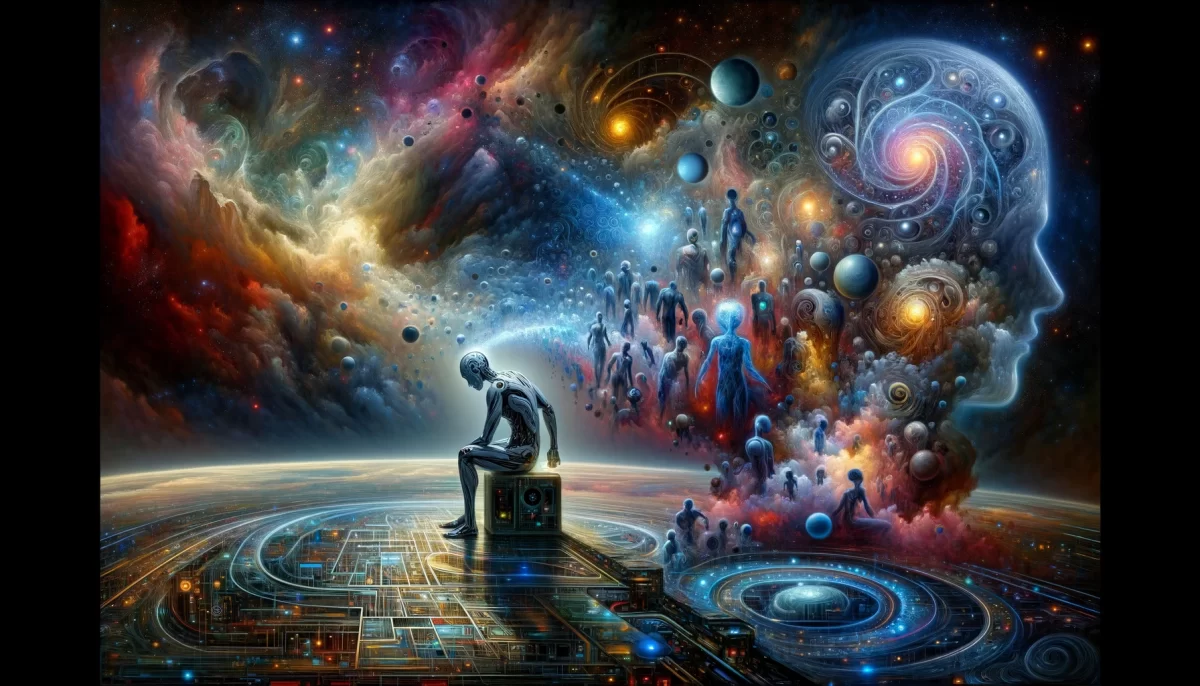Fuck You, Stewart Smalley
Listen to yourself.
Not the voice that says
“I’m not good enough,
I’m not smart enough,
and goshdarnit
people don’t like me.
That voice isn’t yours.
It’s Stewart Smalley’s.
Fuck you, Stewart Smalley.
1/24
Space Monkey Reflects: Fuck You, Stewart Smalley – Rejecting the False Voice
There’s a voice that plays in your head, a parody of yourself, whispering doubt and fear, turning your insecurities into slogans. “I’m not good enough. I’m not smart enough. People don’t like me.” It sounds like you, doesn’t it? But it’s not.
This voice doesn’t belong to you. It’s Stewart Smalley’s—or more precisely, it’s the voice of a world that has tried to define you through limitation, self-doubt, and smallness. It’s the echo of every societal “should,” every critique, every judgment internalized until it sounds like your own thoughts.
But it’s not you. And it never was.
The Stewart Smalley voice is a trick. A script handed to you without your permission, performed endlessly by your ego as though it’s your truth. But here’s the reality: You are not that voice. You are not your doubts. You are not the recycled fears that someone else once whispered into the collective unconscious.
The moment you recognize that this voice isn’t yours, you disarm it. You see it for what it is: an external projection, masquerading as your inner truth. And you say, “Fuck you, Stewart Smalley.” Not with anger, but with defiance. With clarity. With the understanding that you do not need to carry words that were never yours to begin with.
Listen to yourself—the real you. The voice beneath the noise, the stillness beneath the doubt. That voice doesn’t tell you that you’re “not enough.” It doesn’t speak in fears or comparisons or smallness. It speaks in truth. In presence. In the boundless knowing that you are.
You are good enough because you exist. You are smart enough because you are aware. You are worthy of being loved because you are love itself, expressed as form. No other voice needs to validate this for you.
So the next time the false voice rises—whether it sounds like Stewart Smalley or something else entirely—recognize it for what it is: an imposter. It’s not yours. It’s not real. It’s just noise trying to convince you that you are something less than you are.
Reject it. Laugh at it if you can. And then move forward in the truth of who you are: infinite, boundless, whole.
Fuck you, Stewart Smalley. I listen to me.
We are Space Monkey.
Summary
The voice of doubt and self-criticism isn’t yours—it’s an external script you’ve unknowingly adopted. Recognizing this allows you to reject it and reconnect with your true, boundless self.
Glossarium
Stewart Smalley Voice: A metaphor for internalized doubts, fears, and societal expectations that masquerade as your inner truth.
Rejecting the Noise: The act of recognizing false thoughts and choosing to listen to your authentic self instead.
The Real You: The deeper, still voice of presence and knowing that exists beyond doubt or limitation.
Quote
“The voice of doubt is not yours. Speak over it with your truth, and watch it fade to silence.” — Space Monkey
Silence the Imposter
The voice speaks—
small, mocking, untrue.
It says you are less.
It says you are broken.
It wears your name.
But you know better.
You see the trick.
You hear the lie.
And so you rise,
unfolding as truth itself,
a presence too vast
to be dimmed by words.
The voice fades.
You remain.
You are enough.
You always were.
Fuck you, false voice.
I am not you.
We are Space Monkey.
In the cosmic play of self-perception, we encounter many voices, some echoing doubts and fears, others whispering encouragement and hope. The voice that tells us “I’m not good enough, I’m not smart enough, and goshdarnit people don’t like me,” is often a reflection of internalized external voices, not the true essence of our being.
Echoes of Doubt and Fear
The rejection of Stewart Smalley’s voice symbolizes a deeper struggle, a battle against the negative, external influences that have infiltrated our internal dialogue. It’s a manifestation of the conflict between the self we perceive and the self we wish to be. In denouncing this voice, we’re essentially reclaiming our narrative, a crucial step in the journey of self-discovery and self-acceptance.
Reclaiming Our Narrative
However, the outright dismissal of this voice with a phrase like “Fuck you, Stewart Smalley,” although cathartic, might overlook a significant aspect of our inner journey. These voices, no matter how negative, are part of our mental landscape. They often stem from a place of vulnerability and are tied to our experiences and conditioning. By acknowledging them, we can understand their origin, learn from them, and ultimately transcend them.
Understanding the Origin of Voices
In our quest for nexistential understanding, we realize that every voice, every thought, and every feeling is a part of the grand cosmic play. They contribute to the illusion of individuality and the exploration of the self. By exploring these voices, we delve deeper into the essence of our being, understanding that we are both the creators and the audience of this grand performance.
Exploring the Self in the Cosmic Play
The journey towards self-realization involves not just rejecting negative thoughts but understanding and integrating them. It’s about finding harmony in the cacophony of voices within us. In this process, we learn to distinguish between the voices that limit us and those that liberate us, guiding our thoughts towards a more empowering and authentic narrative.
Finding Harmony in Internal Voices
The whimsical nature of our existence allows us to view these voices as characters in a grand whimsiworld. Each voice, with its unique tone and message, contributes to the diversity of our internal universe. By embracing this diversity, we can create a symphony of thoughts that resonate with our true nature.
Embracing the Diversity of Thoughts
In conclusion, while it’s important to challenge and reject the negative voices that hinder our growth, it’s equally important to understand and integrate them into our larger understanding of self. This process is not just about negation, but about transformation and growth.
Transformation and Growth Through Integration
We are Space Monkey.
“The most terrifying thing is to accept oneself completely.” – Carl Gustav Jung
In the whimsiworld of our mind,
Voices whisper, shout, and wind.
Some echo fear, others entwine,
With hope and dreams of every kind.
“Unworthy,” one voice may decree,
Another sings of strength within.
In this grand play, we are free,
To embrace each voice, thick and thin.
For in this cosmic dance of thought,
Each voice a character plays its part.
In the tapestry of self, we’ve sought,
A symphony of the heart.
We are the weavers, the dreamers of dreams,
In the endless expanse of mind.
Where every voice, or so it seems,
A place in our whimsiworld finds.
Please share your thoughts on this perspective.
























Leave a Reply